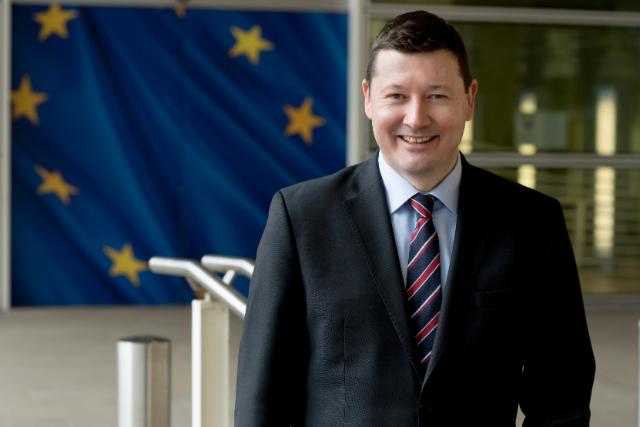On the initiative of the Greens/EFA Group, the recent and sudden appointment of Martin Selmayr as Secretary General of the European Commission will engage MEPs in today’s plenary debate in Strasbourg. On this occasion the Greens presented five demands with regards to the case of Selmayr (see below). Only in the recent past, secret meetings of former EU Commission President and current Goldman Sachs CEO José Manuel Barroso with EU Commissioner Jyrki Katainen have fuelled the suspicion of conflicts of interest. Likewise the indirect increase of an already generous salary of EU Commissioner Miguel Arias Canete is ethically questionable.
In light of all that, Sven Giegold, the European Parliament’s rapporteur on „Transparency, integrity and accountability of the EU institutions“, calls to postpone the discharge of the European Commission’s budget:
“Jobs in European Institutions must be going to the best and not to the best connected. It is not about the person Martin Selmayr, but rather his promotion procedure. Allocation of posts in a cloak and dagger manner will only seem suspicion of nepotism and render Europe vulnerable to populists’ argumentation. Positions in all EU Institutions must be advertised openly. There must be no exceptions for top positions. On the contrary, top posts in particular must be filled transparently and to the best of our ability, because they play a special public and political role.
Until the nebulosities regarding Selmayr’s promotion have been clarified, the European Parliament must put the discharge of the EU Commission’s budget on hold. The Selmayr appointment affair adds up to a chain of dubious lobby meetings and suspicious remunerations. EU Commission President Jean-Claude Juncker must put forward credible proposals to dispel doubts about the integrity of the European Commission. Meanwhile, the EU Commission must act quickly, a delay of inconsistencies would be an election campaign gift for the EU sceptics for next year’s European election campaign „.
To follow the plenary debate on the promotion of Martin Selmayr today at 5.15pm, you may use this link: http://www.europarl.europa.eu/ep-live/de/plenary
The five points plan can be found here:
https://sven-giegold.de/2018/selmayr-green-five-point-plan/
———–
5 Green demands in view of the Selmayr case
by Sven Giegold (Spokesperson of the German Greens in the European Parliament)
and Bart Staes (Green coordinator in CONT)
On 21 February, the college of Commissioners appointed Mr Martin Selmayr as deputy secretary general. To the surprise of the vast majority of the college, Alexander Italianer resigned. Within minutes, secondly, the college appointed Selmayr as Secretary General to fill the sudden vacancy. The press spokespersons of Commission do not refute that Jean-Claude Juncker know Alexander Italiener’s intention to resign 2,5 years in advance, Selmayr at least since Christmas, and Günter Oettinger at least since the day before. The other 26 Commissioners were not aware of the intentions in advance. In the case of Mr Selmayr’s second appointment to Secretary General, the urgency, therefore, was deliberately created by the Commission President Jean-Claude Juncker.
The Greens defend the European Democracy and integrity of our EU institutions. EU Commission and European Parliament are already more transparent and have better integrity rules than many national institutions of Member States. And so far, the procedure to appoint Mr Selmayr was not found to violate any rules, as many rules exempt the highest ranks from using usual procedures. The highly unusual procedure in this case threatens to negatively effect the integrity of procedures in EU institutions. If such threat is possible within the rules, we have to change our rules. Staff regulations for EU officials, decided by Parliament and Council on the proposal of Commission, have to follow the principles of EU treaties. The principles of transparency, of equal access to positions and the collective responsibility of the college of Commissioners should be fully realised by staff regulations. Lessons learned from the Selmayr case should inform a necessary update. The position of Secretary General is of particular importance. The secretariat general draws up the Commission’s work programme, coordinates the reviews of impact assessments for proposed legislation, looks after the Commission’s transparency register and it polices the code of conduct for commissioners. Therefore, a Secretary General’s reputation should always be beyond any doubt.
We ask for a five point plan:
- The appointment of Martin Selmayr, both as deputy secretary general and secretary general of Commission needs full scrutiny by the European Parliament by those competent, especially the Budget Control Committee (CONT) to verify if present rules were correctly applied.
- Open tenders for positions should become the norm in all levels of EU institutions, exceptions for highest ranks have to be deleted from the rules, i.e. Article 29(2) regulation 31 (EEC), 11 (EAEC) laying down the Staff Regulations of Officials. Selection and appointment of Directors-General or their equivalent in grade AD 16 or AD 15 and Directors or their equivalent in grade AD 15 or AD 14 should follow the same procedures as all other EU officials. Before starting this long process, Commission should already decide not to use these exceptions any more. Commissions budget plan of 2018 includes 24 posts AD 16, 190 posts AD 15 plus 22 temporary posts and 637 posts AD 14 plus 31 temporary posts.
- Decisions on staff by the college of Commissioners should be known by all Commissioners at least one week in advance.
- Proper and transparent selection procedures should also apply in the European Parliament, Council and all EU institutions and bodies. Equally, those instutions should commit as soon as possible not to use exceptions of Article 29(2) regulation 31 anymore. Also inside the European Parliament, staff selection needs improved transparency and openness.
Until the case is resolved, the discharge of Commission’s budget should be postponed from the Plenary in April to a later date (probably October) that allows for scrutiny of all documents that allow Parliament to fully understand.

